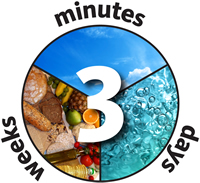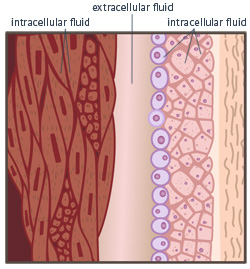Thirst: your body's cry for water
Nothing tastes better when you're thirsty than a tall glass of fresh, clean water.
But what exactly is thirst? Why do we feel thirsty, and what triggers that feeling?
According to biologists, thirst is a subjective perception that stimulates an urge to drink fluids. This urge is an important component of your body's survival system that helps maintain its internal fluid balance. Your desire for fluids can come from many sources, including your habits, customs, culture or psychological needs, as well as from physical responses to fluid losses, increases in hormones, and other changes in your body's chemistry that you usually aren't even aware of until you feel thirsty.
Your personal body of water
Fluids — which include water and all other consumable products that contain water — are essential to staying alive because your (adult) body is about 60- 65% water, and incapable of producing its own water. You lose water all day long through breathing and sweating, as well as through urination (about 1.5 liters), and you need to keep your fluid levels stable in order to maintain a healthy equilibrium. Adults need to drink between 2 and 2.75 litres of water a day, depending on whether they're male or female, and kids' needs vary based on their ages. But to fully appreciate how vital water is, recall the survival rule of 3: You can survive only
- 3 minutes without air,
- 3 days without water, and
- 3 weeks without food.

To understand why water is so vital, it's important to know how our bodies use it. Water exists both inside and between your body cells, as intracellular fluid (inside your cells) and extracellular fluid (between your skin and your cells).

Your brain is in charge of monitoring the fluid balances in your intracellular and extracellular water systems. Both systems must have enough water available to maintain your heart, lungs, brain, digestive system and all other organs, including your skin. Keeping your fluid balance at the optimum level at all times is harder than it sounds because everyone loses water all day long through sweat, tears, urination and a variety of other body functions.
Going with the flow
Although water from your body's intracellular and extracellular systems is lost on a regular basis, the amount lost from each system may be different. For example, if your body loses both salt and water — which occurs for many reasons, such as experiencing the very unpleasant symptoms of a stomach virus — the water in your extracellular system may show a greater drop than the water inside your cells. Salt is one of the compounds that plays a critical role in the fluid balancing act your brain automatically orchestrates every day throughout your body, as is sugar.
Too much or too little salt or sugar can play havoc with your thirst mechanism. And, when it's really hot, when you're ill, or when your diet includes foods or beverages that affect the fluid balance in your intracellular or extracellular systems, it's not uncommon for your water losses to increase, sometimes to dangerous levels.
Water emergency!
Night or day, whenever fluid levels drop inside or outside of your cells, your brain immediately takes notice and initiates a series of complex actions. Its responses include stimulating and secreting hormones and other potent chemicals, activating specific parts of your nervous system, and reducing your water excretion activities as much as possible. But as helpful as these actions are in conserving water for critical activities, none of them can restore the fluid balance in your body.
The only way for fluid restoration to occur is for you to replenish your fluid losses, which is why thirst is your Best Friend Forever. As your brain's unmistakable message for you to drink more water, thirst is a key part of the coordinated series of responses your body makes to maintain the volume and composition of its fluid balance.
And, as you've probably noticed, thirst doesn't like to be ignored, which is why it often triggers other physical sensations — like dry mouth or a faint feeling of hunger — to direct your attention to the nearest source of healthy water.
If you've been out of touch with or unappreciative of your thirst mechanism lately, now's the time to make up and nurture some closeness. Drink lots of water and forego caffeine for a few days to reset the score. Take good care of your thirst and the mechanisms that support it, because it's always taking care of you.
